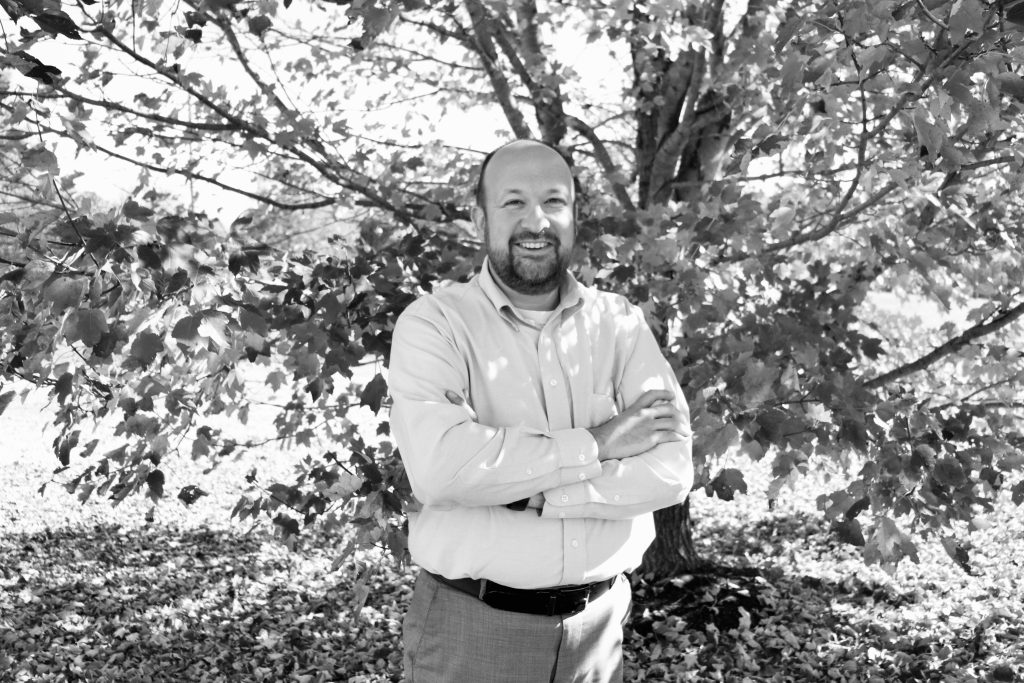Mentoring others comes in all shapes and sizes. Whether you are a part of a large-scale company program or take a mentee under your wing, mentoring in its truest form comes from the heart. Michael Horton has been mentoring others his whole life. He creates bonds through his job as the assistant branch manager of Westmoreland at The Farmers Bank and through his ministry as a preacher.

Horton grew up in a tight knit family in Westmoreland, Tennessee on the family farm. On the farm, they had cows, grew tobacco and harvested hay. When Horton was young, his father hurt his back and couldn’t help with the labor of the farm. Horton stepped up and took on the responsibilities of running the farm. During this time, he learned the meaning of hard work and dedication. Horton’s father mentored him along his recovery of how to keep the farm going strong.
To this day, Horton’s father is a primary mentor in his life. He remembers growing up and his father had three different roles: preacher, farmer and UPS driver. Horton says during the busy months with UPS, his father would work from 6:15 a.m. to 10:15 p.m. every day. Horton would fill in for him on the farm and in his ministry work. Horton would visit funeral homes and hospitals when his father was working because he taught Horton that it was important to let people know that you are always there for others. “He showed me there was a good balance between UPS life, farm life and the preaching life. On Sundays, it was church period. He taught me how to balance every aspect of my life, from work, to home, to church. He was a good example of that.”
Through his father’s wisdom, Horton was molded into the mentor he is today. From years of preaching, Horton has developed an understanding and compassion for others and uses that in his banking job. “In my preaching role, you see many different walks of life. You see many different situations from good and bad. You see people that are hurting, sick, financial trouble, family trouble, and that could be anything from your children, parents or neighbors.”
He uses those past experiences to grow in his communication skills and awareness of those around him. “Nobody is perfect. Everybody has a history. The thing is with your history, go through it, learn from it and build from those lessons. I think as far as the preaching side, that helps me realize everybody is different.”
Horton is a part of The Farmers Bank newly established mentorship program. He speaks about how a mentorship program should be structured and ways to connect with a mentee. Many mentorship programs worry about the age gap, but Horton believes that an older mentor would be a beneficial advisor to someone young who is looking to make their job into a long-term career. Another structure in the program would be meeting specific goals based on the mentees desired role in the company. All while not pressuring the mentee into stressful situations. Horton says, “I think meeting specific goals are important because you need to tell them that you are setting this goal. I expect you to meet it, but don’t feel bad if you don’t. Let’s at least strive to get there.”

There are many ways to connect with a mentee. Horton gives a few examples. He says mentors could go out to lunch or send candy every so often, but he leans on positive affirmations. He says, “I would do positive encouragement, cards, emails, little notes. Just cards that say you are doing a great job, I’ve heard great things or keep up the good work.”
He also thinks a great way to connect with a mentee is keeping them informed with all job roles, not just the mentee’s current position. He says, “The strategy of keeping them informed and keeping them in the loop of things that you figure out is going to make a big difference because it’s trial and error, but if you have already gone through the trail, share the solution with others. This strategy is to keep them informed of the things that you have learned going in and not on the backside. When you see the solution clearly, give your mentee that knowledge.”
Horton is one of The Farmers Bank most positive employees, and he tries to put others first. “I always try to put everyone’s name above mine. I try to make sure everyone is taken care of. I’m always perky, and I try to be. There are very few days that I have a bad day. If I do, I try to not bring it in here.”
At the end of the day, Horton boils down what it takes to be a good example of a mentor and mentee. “I think a positive attitude goes leaps and bounds above a lot of things.”

A positive attitude is something that everyone can strive to include in their everyday walks of life. Everyone has a different story to tell and paths to take, but Horton puts his best foot forward every day to show a positive example to employees and customers. Being a mentor comes with challenges but take advice from Horton where he believes the people you work with is family. He says, “It’s not about me. We are a team and a family.”
Being an assistant branch manager and preacher lets Horton meet all kinds of people. His strength pulls from being a servant leader. The truest form of being a great mentor comes from the heart and Horton succeeds in this talent every day.




